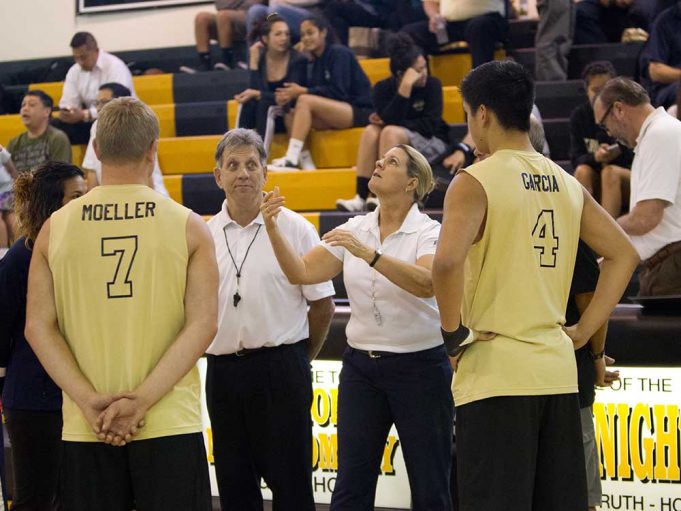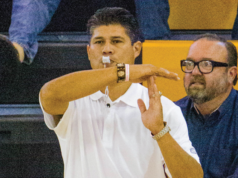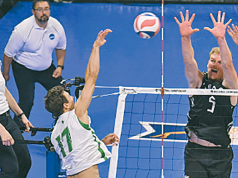You have two chances to make a great first impression at the start of every match: (1) your arrival courtside when you’re tending to your prematch responsibilities, and (2) the captains’ meeting. Wisely use the time during prematch activities. Be efficient. Develop good habits and have a consistent routine.
It starts when you first enter the court with your partner, as a team. Like it or not, you are being sized up by everyone in the gym, whether you’re a new face or a veteran. The players, coaches, event management and the spectators — they’re all watching. They’re looking at your uniform. Be sharp! They’re watching you go through your routine — measuring the net, checking game ball pressure, assessing the court’s overhead obstructions and obstacles on the floor. They’re trying to figure out what kind of game you’re going to call. And right now, all they have to go on is your appearance and your prematch routine.
Strive to be “quietly efficient.” Establish good habits and stick to them. Go about your routine without drawing undue attention. The teams are probably stretching when you first arrive courtside. Use that time to check the net and adjust the antennas — it’s less intrusive than interrupting teams once they begin warmups at the net. If you’re the first referee, get on the stand to make sure it’s stable and elevates you high enough above the net. If not, ask host management to adjust it for you. Check the padding of the net equipment and make sure exposed cables or tensioning devices are covered as needed.
Showing attention to detail during those first moments on the court will help to establish your competency, knowledge and trustworthiness with those who are watching you.
Next, observe the area around the court to determine the ground rules and make sure the two of you agree with the rulings. If one of you is familiar with the venue, share information about ground rules that were used in the past. Tackling that duty together helps establish you and your partner as a team and builds confidence with those watching you.
Now it’s time to check the game ball pressure and ensure the scoring materials are in order. Consider asking that a spare game ball be kept courtside, and check its pressure too. Introduce yourself with a handshake to the scoring crew. Likewise, seek out your line judges and let them know when you’ll be meeting for prematch instructions. Those professional gestures set a good tone, again establishing the crew as a team.
If you didn’t inquire when you arrived, now is the time to make sure you have any match details from the host management — Senior Night, Parents’ Night, special presentations, etc. You’ll want that information for the upcoming captains’ meeting.
At that point, you’ve had the opportunity to establish your presence on the court. People have noticed your teamwork and professionalism. You’ve started on the right foot. Now it’s time to talk the talk at the captains’ meeting.
Here’s your second chance to make a good first impression — the face-to-face meeting and interaction with team leaders. Speak clearly and loudly since there’s often warmup music playing in the background. Be courteous and approachable. Don’t be afraid to smile. Again, have an established routine. Know what you need to cover and the order in which you need to cover it; the order may vary from referee to referee.
Always start with a firm handshake and introduce yourself and allow your partner to do the same. Highlight the playing area, noting any floor or ceiling obstructions. Remind the teams about legal equipment or uniforms, and offer to check questionable items. If it’s early in the season, inform the teams about new protocols or procedures, and ask if they have questions about rule changes. Notify the teams of any prematch presentations or announcements. Ask if there are any questions. Now toss the coin. Wish both teams good luck and return to the scorer with the serve/receive information.
As the season progresses, your prematch captains’ meeting should become shorter. The teams have heard it a dozen times before. Share match-specific details, which can change from night to night, but be a little more general with the routine details, such as court markings. Instead of highlighting every detail of the court, consider asking, “Do you have any questions about the court or playing area?” Keep the meeting short and sweet.
You have two opportunities to make a good first impression before every match — during your prematch routine while you tend to your responsibilities and during the prematch conference with the captains and/or coaches. You don’t often get a second chance to make a good first impression, so you should take advantage of that opportunity and use your prematch time wisely.
What's Your Call? Leave a Comment:
Note: This article is archival in nature. Rules, interpretations, mechanics, philosophies and other information may or may not be correct for the current year.
This article is the copyright of ©Referee Enterprises, Inc., and may not be republished in whole or in part online, in print or in any capacity without expressed written permission from Referee. The article is made available for educational use by individuals.


















